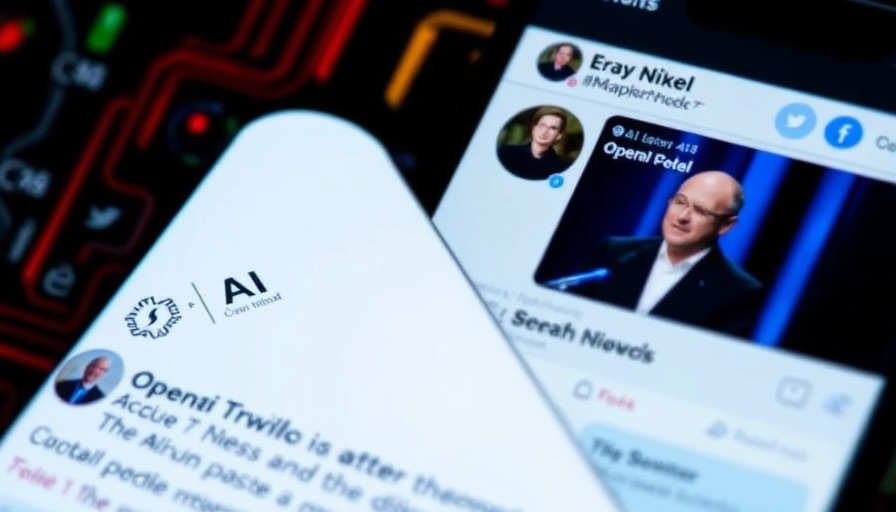
Elon Musk Takes to Court: The OpenAI Nonprofit Trial Set for December
The upcoming court case between tech entrepreneur Elon Musk and AI giant OpenAI marks a pivotal moment in the landscape of artificial intelligence. Set for December, the legal battle underscores shifting priorities in the AI industry. Originally co-founded by Musk and Sam Altman in 2015, OpenAI aimed to develop AI technologies that align with the public interest. However, the organization’s transition to a for-profit model has sparked controversy, leading to a lawsuit from Musk as he seeks to halt this evolution.
Changing Landscape of AI: Why This Trial Matters
Musk's lawsuit, filed in 2024, alleges that OpenAI has abandoned its nonprofit roots, transforming into a profit-driven entity that prioritizes financial gain over its altruistic mission. Musk claims this shift deviates from the original vision of creating technology that benefits humanity as a whole. OpenAI counters that evolving into a for-profit model is essential for competitiveness in a rapidly growing sector. They argue this move helps secure necessary funding, evidenced by a significant $6.6 billion round last year, aimed at bolstering their position against other rivals in the AI arena.
Elon Musk's AI Rivalry: The Bigger Picture
This feud is more than just a corporate spat; it highlights Musk's broader rivalry within the AI market. After leaving OpenAI, Musk founded xAI, a competing startup. Critics and analysts have suggested that Musk's litigation serves as a strategic maneuver to disrupt OpenAI and bolster his own ventures. Meanwhile, OpenAI’s leadership, including CEO Sam Altman, is focused on demonstrating that their for-profit structure still maintains an element of community responsibility. Altman asserts that Musk's claims are misconstrued, arguing that progress in AI can align with societal good.
The Court's Stance: A Delicate Balance of Interests
As the trial date approaches, critical decisions loom over whether the case will be tried by a jury or a judge. This determination holds significance for both parties, potentially influencing the trial's outcomes. Recent court rulings have allowed Musk’s claims to move forward while rejecting his attempts to halt OpenAI’s transition entirely. This reveals a recognition within the judiciary of the pressing public interest involved, raising questions about corporate governance, ethics, and the future of AI.
Policy Proposals Amidst the Litigation
Coinciding with the trial preparations, OpenAI has submitted policy proposals to the White House to bolster America’s AI landscape. These proposals aim to create a framework that enhances competition while ensuring safety and innovation within the industry. Among suggestions is a call to establish a federal strategy for AI laws that could preempt state-level regulations, thereby streamlining compliance for tech companies. Such moves signify OpenAI's ambition not only to navigate the legal landscape but also to shape policy in a way that safeguards its future.
The Future of AI and Its Stakeholders
As this trial unfolds, the outcome will resonate widely beyond just Musk and OpenAI. It may set precedents regarding how AI companies operate, striking a balance between profit motives and ethical responsibilities. Investors, tech enthusiasts, and policymakers alike will be keenly watching, as the decisions made in court could significantly influence the AI industry’s trajectory for years to come.
The ongoing battle highlights an evolving paradigm within the tech world, where ethical considerations conflict with financial imperatives. For AI lovers interested in these developments, understanding the complexities of this case is essential, as it represents both the challenges and opportunities present in the rapidly changing landscape of artificial intelligence.
As the trial date draws near, we encourage tech aficionados and concerned citizens to pay attention to how this pivotal moment in AI history unfolds. Will the court side with Musk’s vision for AI, or will OpenAI’s argument that profit is essential for progress prevail? The answers to these questions could reshape our understanding of how technology can and should serve society.
 Add Row
Add Row  Add
Add 




 Add Row
Add Row  Add
Add 

Write A Comment